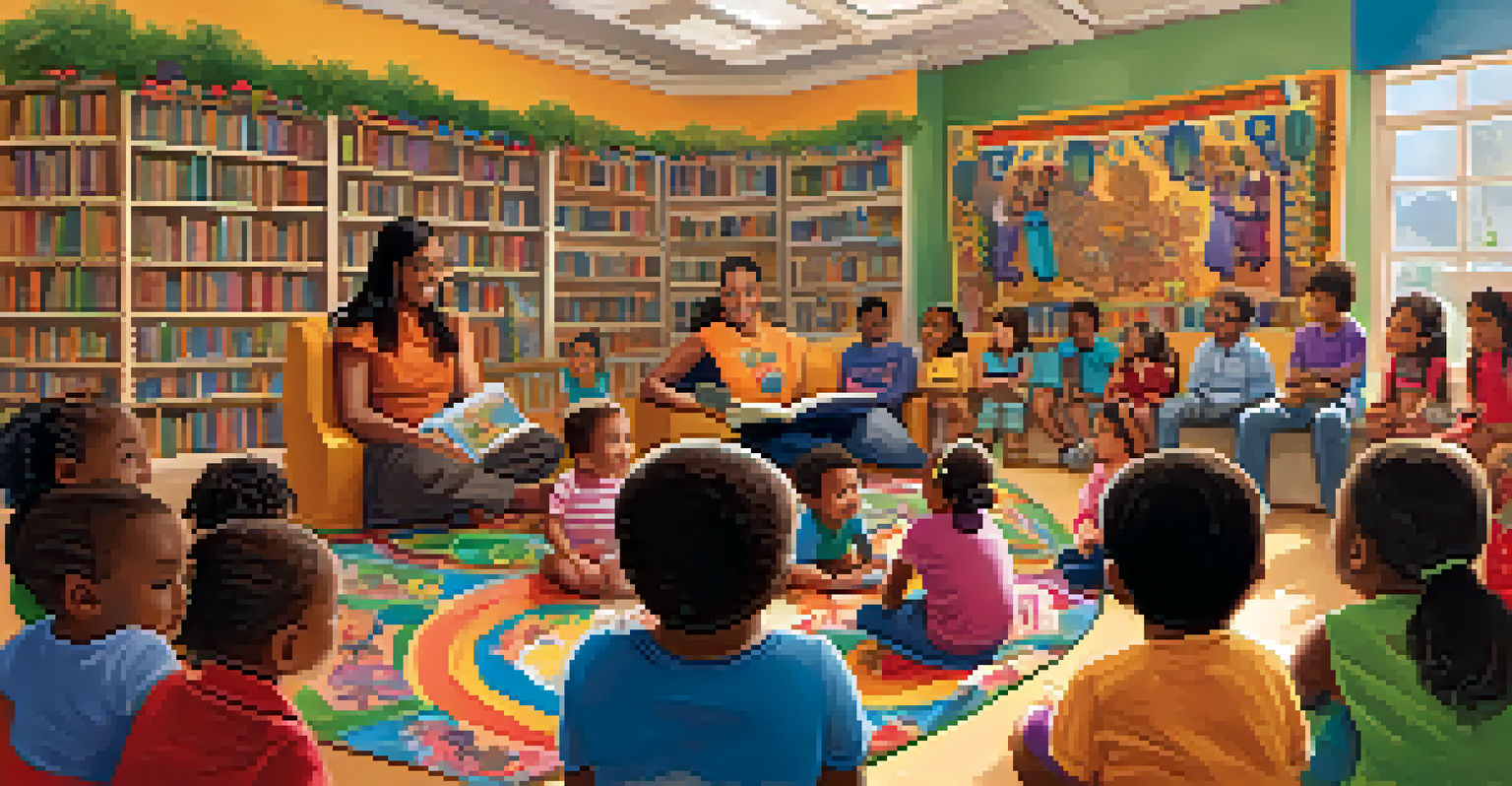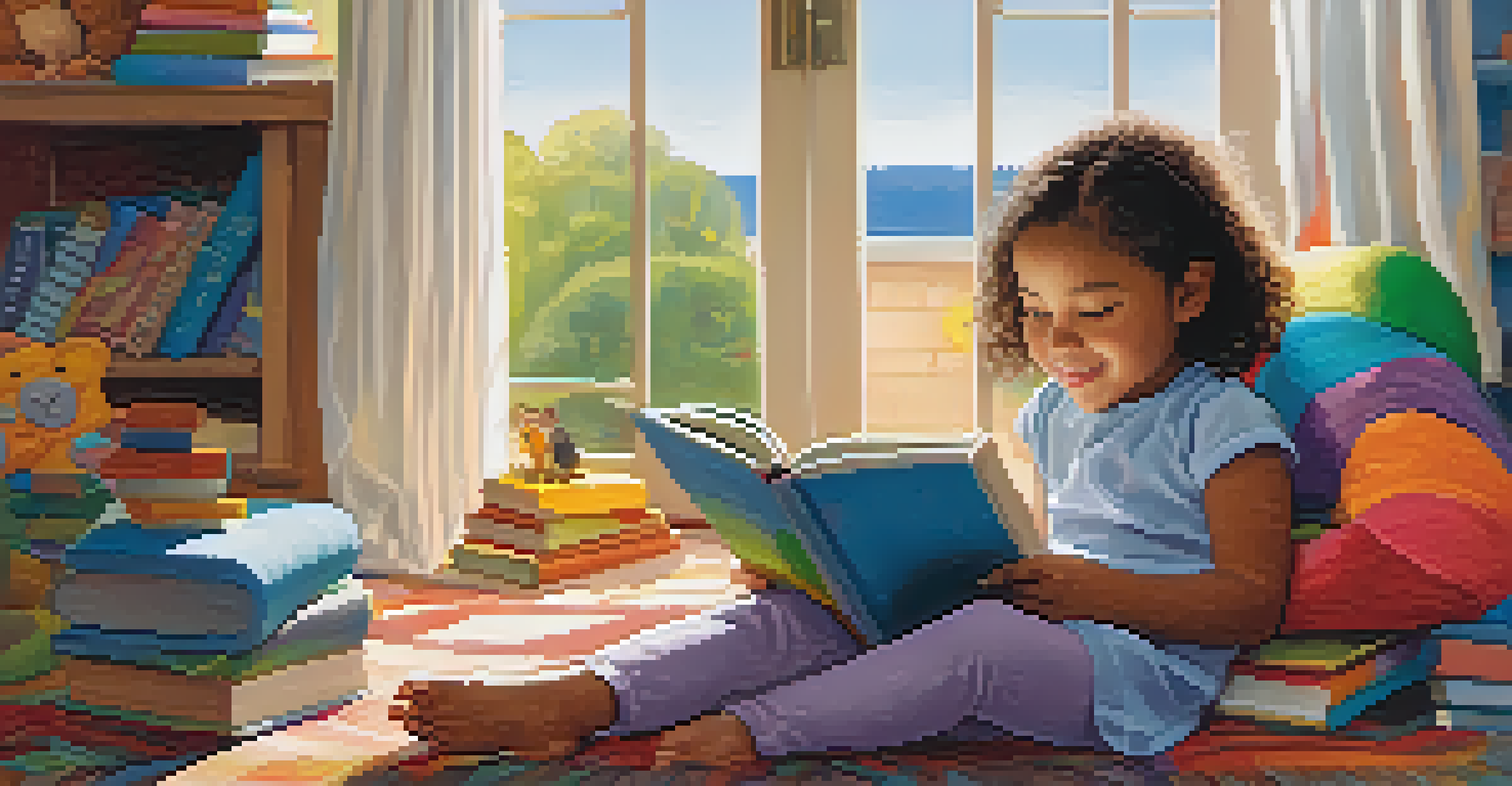Children's Literature: Austin Bookstores for Young Readers

A Brief Overview of Children's Literature
Children's literature is a rich and vibrant field that fuels imagination and sparks creativity in young minds. It encompasses a diverse range of genres, from picture books to middle-grade novels, each crafted to cater to different age groups and interests. These stories not only entertain but also teach valuable lessons, helping children navigate their world.
Children are made readers on the laps of their parents.
In recent years, there's been a resurgence in the appreciation of children's books, with parents and educators recognizing their importance in childhood development. The right book can inspire a love for reading, develop empathy, and even enhance cognitive skills. This growing interest has led to a flourishing market for children's literature, particularly in cities like Austin.
Austin is home to a plethora of independent bookstores dedicated to young readers, each offering a unique selection of titles. From cozy nooks filled with colorful picture books to sections brimming with adventurous tales for older kids, these bookstores are treasure troves for parents and children alike.
The Importance of Local Bookstores for Kids
Local bookstores play a crucial role in fostering a love for reading among children. Unlike large chain retailers, these independent stores often provide a personalized experience, where staff members are passionate about books and eager to recommend titles that will resonate with young readers. This personal touch can make all the difference in a child's reading journey.

Moreover, local bookstores often host events such as storytime sessions, author readings, and book clubs aimed at children. These activities not only engage kids with literature but also create a sense of community around reading. Families can connect with other book lovers, share recommendations, and inspire one another through their shared love of stories.
Children's Books Foster Growth
Children's literature not only entertains but also plays a crucial role in developing empathy, cognitive skills, and a love for reading.
Additionally, supporting local bookstores helps to sustain the local economy and encourages a thriving literary culture. When families choose to shop at independent stores, they contribute to a vibrant community that values creativity and storytelling, which ultimately benefits young readers.
Top Austin Bookstores for Children's Literature
Austin boasts several fantastic bookstores dedicated to children's literature, each with its own charm and character. One standout is BookPeople, the largest independent bookstore in Texas, which features an extensive children's section filled with both classic and contemporary titles. Their knowledgeable staff often provides personalized recommendations, making it a go-to spot for families.
A book is a gift you can open again and again.
Another beloved store is the Blue Willow Bookshop, known for its cozy atmosphere and a carefully curated selection of children's books. They host regular events, including storytimes and author signings, which help cultivate a love for reading among young visitors. Their commitment to connecting kids with stories is evident in every corner of the store.
Don't miss out on the Little City Books, a delightful children’s bookstore that offers a charming selection of picture books, chapter books, and educational resources. Their focus on interactive and engaging experiences makes it a great stop for parents looking to inspire their little ones. Each of these bookstores contributes uniquely to Austin's literary landscape.
Events and Activities for Young Readers
One of the best ways to encourage a love for reading in children is through engaging events and activities. Many bookstores in Austin host regular events specifically designed for young readers, such as storytime sessions, craft activities, and author visits. These events not only make reading fun but also create memorable experiences for families.
For instance, BookPeople often organizes events featuring children's authors, where kids can meet the authors and learn about the writing process. This kind of interaction can greatly inspire young readers and give them a sneak peek into the world of storytelling. Such experiences help children develop a deeper appreciation for the art of literature.
Local Bookstores Enhance Reading
Independent bookstores offer personalized experiences and community events that engage children and families in the joy of reading.
In addition to author events, many bookstores offer themed storytimes, where children can gather to listen to tales centered around specific topics or holidays. These sessions are not just entertaining; they also encourage social interaction and foster a sense of community among young readers and their families.
The Role of Diversity in Children's Literature
Diversity in children's literature is more important than ever, as it allows young readers to see themselves reflected in the stories they read. With a wide range of cultural backgrounds, experiences, and perspectives represented in literature, children can learn about and appreciate the richness of the world around them. This exposure fosters empathy and understanding from an early age.
Local bookstores in Austin are making strides in promoting diverse literature, ensuring that children of all backgrounds can find stories that resonate with them. By highlighting books featuring diverse characters and narratives, these stores contribute to a more inclusive literary landscape. Parents can feel confident knowing they are supporting a culture that values representation.
Furthermore, events focused on diversity, such as multicultural storytimes or themed book displays, help to celebrate different cultures and experiences. These initiatives not only enrich children's reading experiences but also encourage open conversations about diversity and inclusion within families and communities.
How to Choose the Right Books for Your Child
Choosing the right books for your child can sometimes feel overwhelming, given the vast array of options available. A great starting point is considering your child's age, interests, and reading level. Picture books are ideal for younger kids, while early chapter books may suit those who are ready for a bit more complexity. Knowing your child's preferences can help narrow down the choices.
Another effective strategy is to engage with bookstore staff, who are often well-informed about the latest releases and can recommend books based on your child's interests. Don't hesitate to ask for suggestions! Many bookstores also have curated sections highlighting popular or award-winning titles, which can serve as excellent resources for parents.
Diversity Enriches Young Readers
Diverse literature allows children to see themselves in stories, fostering empathy and understanding of different cultures.
Lastly, consider the themes and messages behind the stories you choose. Books that promote kindness, resilience, and curiosity can have a lasting impact on a child's development. Reading together and discussing the story can also enhance your child's understanding and enjoyment, making the experience even more meaningful.
Supporting Literacy Beyond the Bookstore
While bookstores are vital in promoting literacy, there are many ways to support children's reading journeys outside of the store. One effective method is to create a reading routine at home. Setting aside time each day for reading, whether it's a cozy bedtime story or a quiet afternoon session, helps instill a love for books in children.
Additionally, parents can encourage children to explore different genres and formats, from comic books to audiobooks. This variety keeps reading fresh and exciting, allowing kids to discover new interests along the way. Visiting local libraries is another great option, as they often host events and offer a vast selection of books for all ages.

Lastly, engaging in conversations about the books your child reads can enhance their comprehension and critical thinking skills. Ask open-ended questions, discuss characters' motivations, and relate stories to real-life experiences. These discussions not only deepen your child's understanding but also strengthen your bond through shared literary experiences.